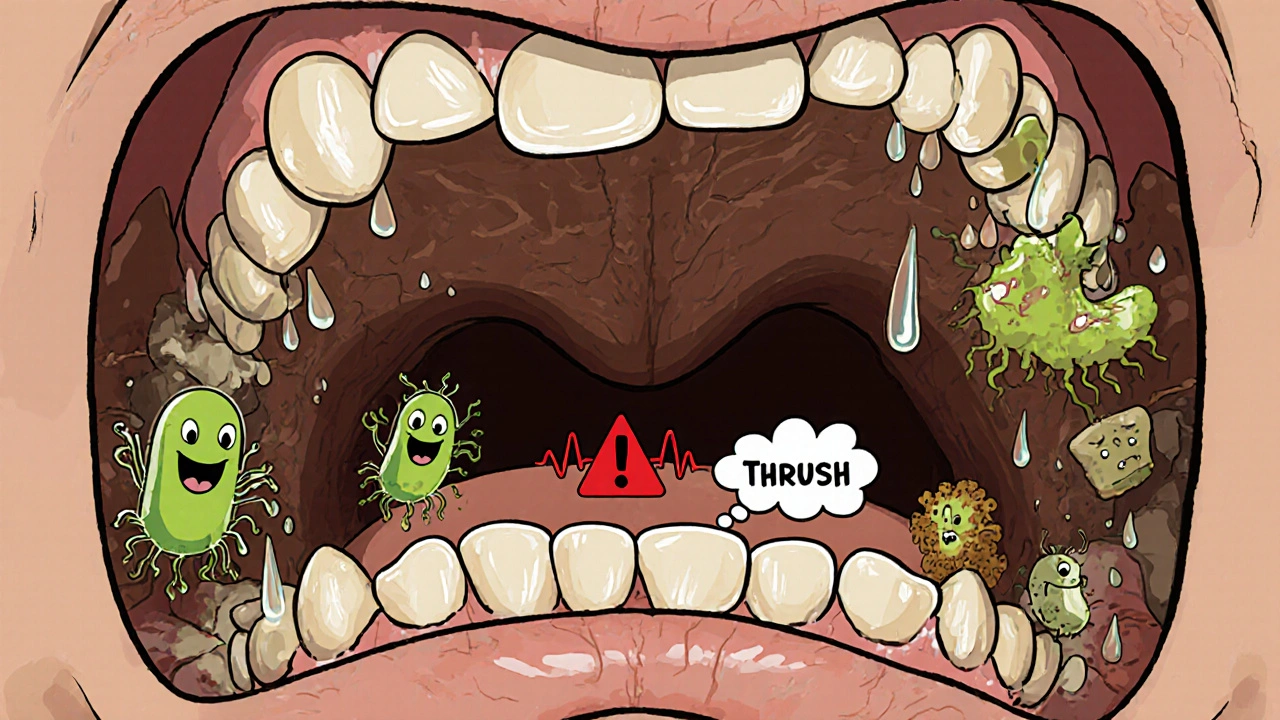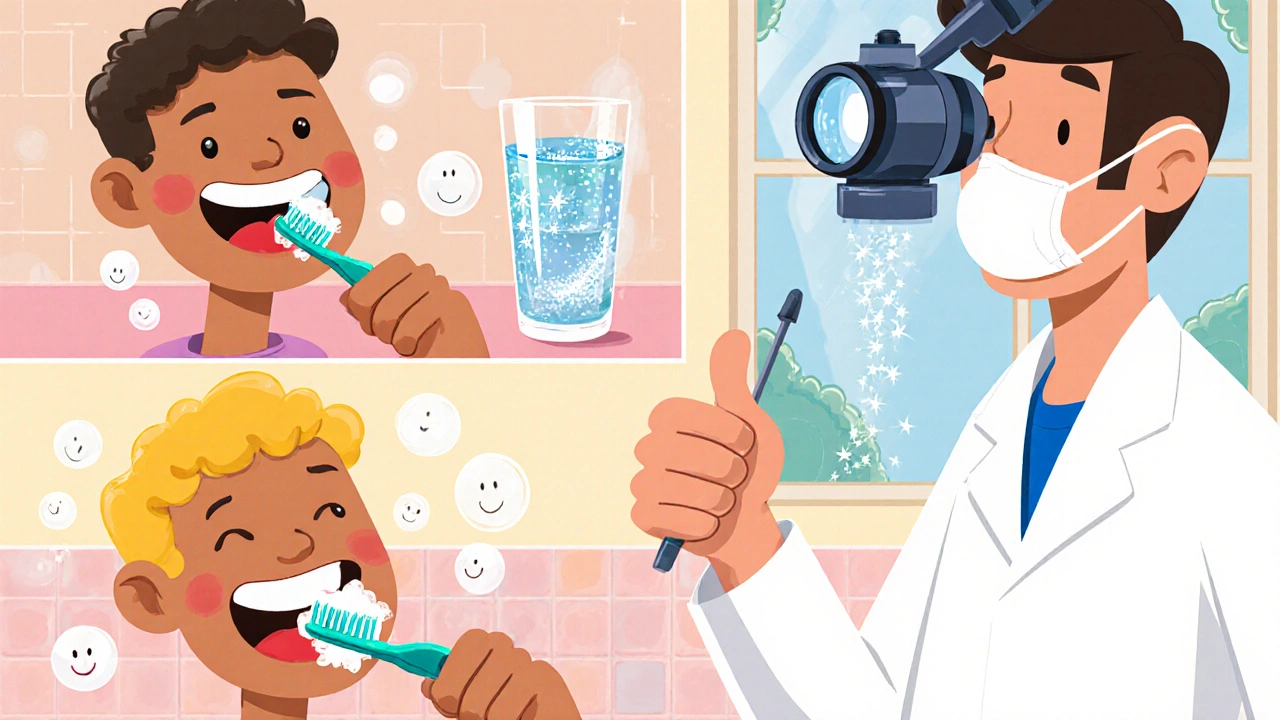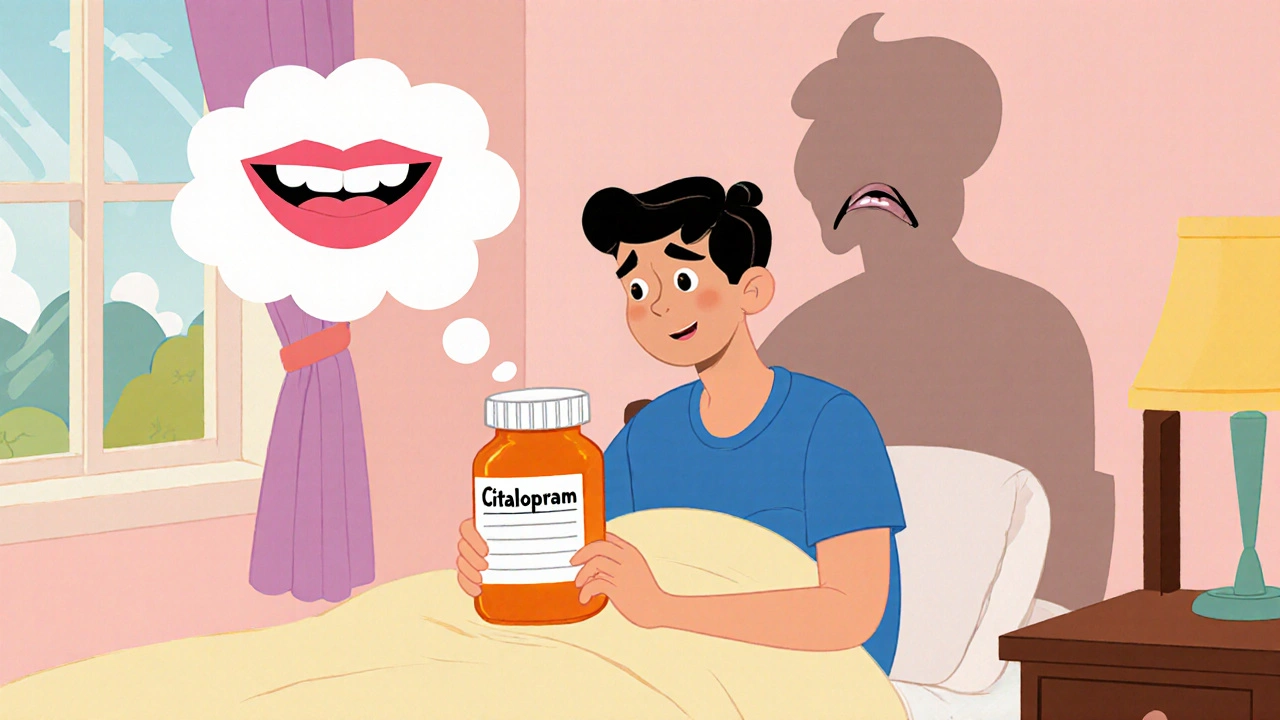Citalopram Dental Risk Assessment Tool
Your Risk Assessment
Answer these questions to determine your risk level for dental issues while taking Citalopram. Select all that apply to you.
When you’re prescribed a medication for mental health, the last thing you want to worry about is your smile. Yet many people on Citalopram Hydrobromide notice changes in their mouth that can lead to real dental problems. This guide breaks down what the drug does, why it can affect your teeth and gums, and what you can do right now to keep your oral health on track.
Citalopram Hydrobromide is a prescription antidepressant belonging to the selective serotonin reuptake inhibitor (SSRI) class, commonly used to treat depression and anxiety disorders. It works by increasing the amount of serotonin available in the brain, which can lift mood and reduce anxiety. While its primary goal is mental health, the drug’s impact on the body isn’t limited to the brain, and the mouth is often an overlooked side‑effect zone.
What Is Citalopram Hydrobromide?
Citalopram Hydrobromide is the chemically stable salt form of citalopram, the active ingredient you’ll see listed on a prescription label. Marketed under brand names like Celexa, it is taken once daily, typically in doses ranging from 10 mg to 40 mg. The drug has a half‑life of about 35 hours, meaning it stays in the system for several days after you stop taking it. Most patients start seeing mood‑lifting effects within 2-4 weeks, but side effects can appear much sooner.
Common systemic side effects include nausea, headache, and occasional dizziness. For dental professionals and patients alike, the most relevant side effect is the alteration of saliva flow, which can set the stage for a cascade of oral health issues.
How Citalopram Affects Saliva Production
Saliva does more than keep your mouth wet. It buffers acids, provides minerals for enamel remineralisation, and carries antimicrobial proteins that keep bacterial overgrowth in check. Citalopram can interfere with the autonomic nervous system signals that tell salivary glands to produce fluid, leading to a condition known as xerostomia or dry mouth.
Studies from 2023‑2024 show that up to 15 % of patients on SSRIs report clinically significant dry mouth, with citalopram ranking near the middle of the class. The reduction in salivary flow can be subtle at first-maybe you notice a sticky feeling or a need to sip water more often-but over weeks it can become enough to change the oral environment dramatically.
Common Dental Issues Linked to Citalopram
- Increased dental caries: With less saliva to neutralise acids, plaque bacteria produce more enamel‑eroding acids after meals.
- Accelerated periodontal disease: Dry mouth promotes plaque accumulation on the gum line, making gums more prone to inflammation and recession.
- Oral thrush (Candida overgrowth): A moist, acidic environment without the protective enzymes in saliva lets fungi flourish.
- Altered taste perception (dysgeusia): Some patients report a metallic or bitter taste that can drive them to sugary snacks, worsening caries risk.
- Increased risk of dental erosion: Acidic beverages feel more soothing when your mouth is dry, leading to higher consumption.
These issues don’t all happen at once. The most common first sign is a noticeable increase in plaque and a sticky feeling after meals. If you ignore it, cavities can develop within months, especially on the biting surfaces of molars where plaque tends to linger.

Who Is Most at Risk?
Not every Citalopram user will experience severe dental problems. Risk spikes when you combine the medication with other factors:
- Age: Older adults naturally produce less saliva, so the drug’s impact is magnified.
- Concurrent medications: Antihistamines, diuretics, and other antidepressants can also dry the mouth.
- Smoking or vaping: These habits already reduce saliva and increase plaque.
- Poor oral hygiene: Skipping brushing or flossing gives bacteria a free pass.
- High‑sugar diet: Frequent sugary drinks exploit the reduced protective buffer.
If you check any of these boxes, it’s a good idea to start a proactive oral‑care routine the moment you begin Citalopram.
Tips to Protect Your Teeth and Gums While Taking Citalopram
Good oral health is a habit, not a one‑off task. Here are evidence‑based steps that fit easily into a daily routine:
- Stay hydrated: Sip water throughout the day. Aim for at least 8‑10 glasses; the extra fluid helps stimulate salivary glands.
- Chew sugar‑free gum: Xylitol‑sweetened gum can boost saliva flow and also reduce plaque bacteria.
- Use saliva substitutes: Over‑the‑counter sprays or lozenges (e.g., Biotène) mimic natural saliva and are especially useful at night.
- Brush twice daily with fluoride toothpaste: Fluoride reinforces enamel, a crucial defense when acid attacks increase.
- Floss or use interdental brushes every evening to break up plaque under the gum line.
- Limit acidic and sugary drinks: If you need a flavor boost, choose water with a splash of citrus rather than soda.
- Schedule regular dental check‑ups: A professional cleaning every six months removes hardened plaque (tartar) that home care can’t reach.
- Consider a prescription‑strength fluoride rinse if you have a high caries risk; your dentist can recommend the right concentration.
Most of these steps can be set up in under five minutes a day, yet they collectively lower the chance of cavities by up to 40 % in high‑risk groups, according to a 2024 UK dental health survey.
Dental Care During Dental Procedures
If you need a filling, crown, or extraction while on Citalopram, there are a few extra considerations:
- Bleeding risk: Citalopram can mildly affect platelet function, potentially increasing bleeding time. Let your dentist know you’re on an SSRI; they may apply a local haemostatic agent.
- Local anaesthetic interactions: No major interactions are reported, but some patients report a prolonged numbness sensation. Reporting any unusual feeling helps the dentist adjust dosage.
- Post‑operative dry mouth: After surgery, you might experience heightened dryness. Using a saline mouth rinse and saliva substitutes can speed healing.
Most procedures go smoothly, but open communication prevents surprises.

When to Talk to Your Dentist or Doctor
Don’t wait for a toothache to raise the alarm. Contact your dental professional if you notice any of the following while on Citalopram:
- Persistent dry mouth that doesn’t improve with water or chewing gum.
- New‑onset sore spots, white patches, or persistent bad breath.
- Increased frequency of cavities or gum bleeding between cleanings.
- Difficulty swallowing or a feeling of food sticking in the mouth.
Your prescribing doctor may adjust the dose or switch to another antidepressant with a lower xerostomia profile. Any medication change should be done under professional guidance.
Quick Reference Table
| Side Effect | Typical Onset | Impact on Oral Health | Management Tip |
|---|---|---|---|
| Dry mouth (Xerostomia) | 1-2 weeks | Reduced buffering, higher caries risk | Hydration, sugar‑free gum, saliva substitutes |
| Increased plaque | 3-4 weeks | Gum inflammation, periodontal disease | Floss daily, professional cleanings |
| Oral thrush | 4-6 weeks | White patches, discomfort | Antifungal mouthwash, maintain oral hygiene |
| Altered taste | 2-3 weeks | Cravings for sugary foods | Choose sugar‑free alternatives, use flavour‑less saliva gels |
Frequently Asked Questions
Can I stop taking Citalopram if I develop dry mouth?
Never stop abruptly. Talk to your prescriber; they might lower the dose, add a short‑acting SSRI, or switch to another class. Sudden withdrawal can cause rebound depression or anxiety.
Is dry mouth the only oral side effect of Citalopram?
No. Besides xerostomia, patients report increased plaque, gum inflammation, occasional oral thrush, and taste changes. Each of these links back to reduced saliva flow.
Do over‑the‑counter saliva substitutes work?
Yes, products like Biotène spray or lozenges can temporarily relieve dryness and make brushing easier. Look for those containing carboxymethylcellulose, which mimics natural mucus.
Should I tell my dentist I’m on Citalopram before a cleaning?
Yes. The dentist will note the potential for increased bleeding and may adjust the cleaning technique or suggest a more frequent maintenance schedule.
Are there any foods that can help counteract the dry mouth?
Water‑rich foods like cucumber, melon, and apples stimulate saliva. Chewing fresh parsley or mint leaves also boosts natural secretions.

Sunil Yathakula
October 19, 2025 AT 19:41Hey buddy, I get that taking citalopram can feel like a rollercoaster, but trust me, keeping a water bottle handy is a game‑changer. Your saliva needs that extra push, so sip often, especially after meals. Even a quick gulp of room‑temp water can stimulate the glands and wash away stray sugar. If you can, chew some sugar‑free gum – it not only freshens breath but also amps up flow. Remember, little habits stack up, and you’ll thank yourself when the dentist says “great job”.
Catherine Viola
October 19, 2025 AT 20:53It is incumbent upon us, as discerning readers, to scrutinize the purported neutrality of pharmaceutical literature. The author’s assertion that citalopram merely causes xerostomia overlooks the broader pharmacodynamic cascade influencing platelet aggregation and mucosal immunity. One must consider that the cited studies are often funded by entities with vested interests, thereby introducing an insidious bias. Moreover, the recommendation to “stay hydrated” is, at best, a superficial mitigation lacking empirical substantiation in peer‑reviewed trials. In sum, while the guide is well‑intentioned, its omissions betray a systematic under‑reporting of adverse oral outcomes.
Nicole Boyle
October 19, 2025 AT 23:40From a clinical informatics standpoint, the interplay between SSRI‑induced anticholinergic load and oral microbiome dysbiosis is a classic case of iatrogenic feedback loops. Salivary hypofunction reduces the clearance of Streptococcus mutans, precipitating a cascade of demineralization events. Practitioners should therefore employ quantitative salivary flow rate measurements – ideally sialometry – to stratify risk before initiating therapy. Additionally, adjunctive probiotic regimens could re‑equilibrate the oral flora, curbing pathogenic biofilm formation. Bottom line: a data‑driven, multidisciplinary protocol beats anecdotal advice any day.
Caroline Keller
October 20, 2025 AT 01:03Wow, another dental nightmare just because of a pill.
dennis turcios
October 20, 2025 AT 02:26Let’s cut through the optimism and look at the hard facts: SSRIs like citalopram are a double‑edged sword. Yes, they lift mood, but the collateral damage to oral health is rarely mentioned in the consent forms. Patients who ignore the dry‑mouth warning end up with rampant caries, and the cost of restorative work dwarfs the price of the medication. If you’re going to prescribe, you have an ethical duty to provide a preventive regimen upfront. Anything less is a half‑hearted, profit‑driven approach that leaves the patient holding the bag.
Felix Chan
October 20, 2025 AT 03:50Stay positive, everyone! The good news is that the steps listed in the guide are actually super easy to fit into a busy day. A quick glass of water, a piece of sugar‑free gum, and a solid brushing routine can keep your smile bright while you’re feeling better mentally. Keep tracking your progress and celebrate the small wins – you’re doing great!
Thokchom Imosana
October 20, 2025 AT 05:13It is paramount to recognize that the pharmaceutical industry operates under a veil of clandestine agendas, meticulously engineered to conceal the full spectrum of iatrogenic repercussions associated with selective serotonin reuptake inhibitors such as citalopram hydrobromide. The seemingly innocuous side‑effect of xerostomia is, in actuality, a strategic vector designed to precipitate a cascade of oral pathologies, thereby creating an ancillary market for dental remediation services that thrive on chronic mouth dryness. This deliberate orchestration is substantiated by internal memos leaked from corporate boardrooms, wherein executives acknowledge the “dual‑benefit” model that simultaneously addresses mental health while inflating dental revenue streams. Moreover, the suppression of comprehensive adverse‑event reporting in clinical trials is not a mere oversight but a calculated omission to preserve the lucrative image of these compounds. Academic journals, under pressure from high‑impact pharma funding, often truncate discussion sections, thereby obscuring the nuanced interplay between serotonergic modulation and salivary gland autonomic control. Consequently, primary care physicians and psychiatrists receive filtered information, lacking the granular data required to make fully informed prescribing decisions. Patients, therefore, become unwitting participants in a socio‑medical experiment where their oral health is leveraged as a secondary profit engine. The recommendation to “stay hydrated” is a superficial Band‑Aid, insufficient to counteract the systemic desiccation induced at the cellular level by chronic SSRI exposure. Only through concerted advocacy, transparent data sharing, and interdisciplinary oversight can this covert exploitation be dismantled, restoring agency to the individual and safeguarding both mental and dental well‑being.
ashanti barrett
October 20, 2025 AT 06:36I hear you on the criticism, but it’s also worth noting that patients often feel helpless when side effects hit. Offering concrete tools like sugar‑free gum or salivary substitutes can empower them to take control, rather than just fearing the medication.
Leo Chan
October 20, 2025 AT 08:00Exactly! Small wins add up. If you make a habit of a quick water break after every coffee, you’ll notice your mouth feels less sticky and you’ll have fewer cravings for sweets.
jagdish soni
October 20, 2025 AT 09:23One must contemplate the epistemological ramifications of accepting a pharmacological narrative that reduces the human organism to a series of biochemical checkpoints. The reductionist lens strips away the ontological richness of lived experience, relegating the mouth to a mere substrate for therapeutic side‑effects. Yet, in our relentless pursuit of symptom alleviation, we neglect the holistic interplay between psyche, soma, and the micro‑ecosystem of oral flora. Perhaps the true antidote lies not in more saliva substitutes, but in a paradigm shift toward integrative care that honors the symphony of bodily systems.
Latasha Becker
October 20, 2025 AT 10:46While the philosophical musings are intriguing, they distract from the empirical reality: the incidence rates reported in the 2024 UK dental health survey are statistically significant. Ignoring hard data in favor of abstract discourse undermines evidence‑based practice.
parth gajjar
October 20, 2025 AT 12:10Oh, the drama! Imagine a world where every pill drips doom into our mouths, turning smiles into grimaces. It’s a tragedy worthy of a Shakespearean tragedy, not a bland medical pamphlet.
Maridel Frey
October 20, 2025 AT 13:33For those seeking actionable guidance, I recommend coordinating with your dental professional to schedule a prophylactic cleaning within one month of initiating citalopram. This proactive approach allows early detection of plaque accumulation and facilitates timely fluoride application, thereby mitigating the heightened caries risk outlined in the guide.
Jameson The Owl
October 20, 2025 AT 14:56Let me be clear: the push to downplay SSRI side effects is a concerted effort by global health agencies to keep the populace docile. They flood the market with “hydration tips” while silently funding dental clinics that reap profits from the very dryness they induce. This is not a coincidence-it is a strategic manipulation of public health policy to serve a hidden agenda. Wake up, question the narrative, and demand full transparency.